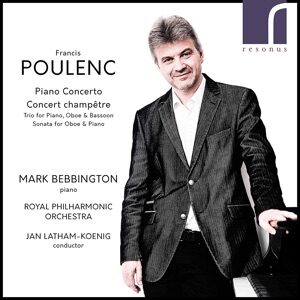Conventional wisdom has it that Poulenc’s Concert champêtre works best on a harpsichord, and so it does, in some ways; and yet, the piano alternative has distinct advantages also. Principal among them is that the larger instrument solves any issues of balance between solo and orchestra. Also, the spindly and often clattery harpsichord creates a buzz of noise that obscures the music’s delightful harmonic detail in passages written in block chords, an issue that happily does not exist with the piano. So, it’s fair to say that the piano version has a legitimacy all its own, not in preference to the original, but as an adjunct to it.
However, until now, there has been no recommendable recording of the work in its piano version (and I’m pretty sure I’ve heard them all). Finally, we have a release that realizes the music’s insouciant character from both the conductor and the soloist, played to a high standard, and captured in good modern sound. Mark Bebbington, to his credit, plays the piano like a piano. At times, such as in the latter stage of the finale (taken at a moderate tempo), the result might sound a touch heavy, but there’s something to be said for giving the music time to “speak” with an instrument that has real sustaining power. The result, ultimately, is very enjoyable and definitely worth hearing if you love the work.
The “fillers” are much more than that. Bebbington plays the Piano Concerto very convincingly, with romantic sweep where required, and a welcome degree of poise in the central Andante con moto that prevents the simple writing from sounding merely facile. In the closing pages, the music hasn’t quite the “swing” that we hear in the best French performances, but otherwise there are no complaints about the quality of conductor Jan Latham-Koenig’s accompaniments.
This performance of the Trio for Piano, Oboe, and Bassoon is simply fantastic. I can’t praise enough the discipline and control of the players in resisting the temptation to make a fetish out of the music’s neoclassical idiom, and breeze through it as quickly as possible. The woodwind solos truly breathe, and the finale, for once not taken too quickly, has so much more substance and character when you can savor its delicious harmonies. In the Oboe Sonata, John Roberts makes a first-class soloist (as he also is in the trio, with the excellent bassoonist Jonathan Davies). very moving in the concluding “Déploration”.
On the whole, this release was designed as a showcase for pianist Mark Bebbington, and what a smart one it turns out to be. Shrewdly chosen repertoire gives him the opportunity to shine both as soloist and an accompanist–to demonstrate bravura and sensitivity in equal measure, in music as rewarding to listen to as it must have been to play. In short, there’s nothing here to complain about, and a great deal to savor. This one’s a keeper.
































